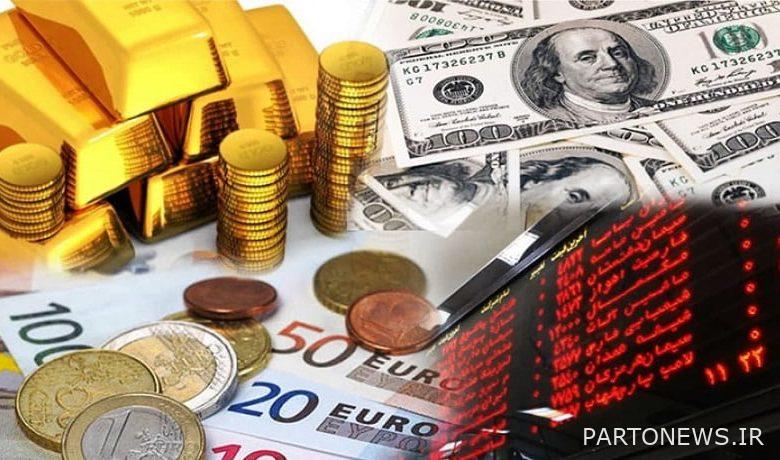Which market should we invest in next year? – Tejarat News

to report Tejarat NewsIn this seminar, the five financial markets of stock exchange, gold, currency, cryptocurrency and housing were examined and investment in financial markets was prioritized for 1402.
Waleed Hilalat in the capital market sector, Siamak Ghasemi in the dollar and gold sector, Sohail Nikzad in the housing sector, Puya Jabal Aamili in the macroeconomic sector and Behrouz Maleki in the housing sector gave their views and Hossein Abdo Tabrizi summarized the contents.
Strong currency fluctuations continue
Siamak Ghasemi, financial market expert In the field of dollar and gold, he emphasized: “With the continuation of inflationary stagnation in Iran’s economy, there will be a possibility of continued severe currency fluctuations.”
He said: “Increasing inflation, incorrect monetary policies and a significant reduction in the real interest rate have increased the demand for buying foreign currency. This is despite the fact that political developments and protests in the last 6 months have greatly increased the demand for the withdrawal of foreign currency and the preservation of assets.
This financial market expert pointed out the difficulty of accessing currency notes from the channels of neighboring countries and added: “Currently, the power of the Central Bank’s short-term intervention in the market has decreased. Also, the ban on foreign exchange transactions and the intensification of demand in the coin market as a legal substitute for currency has caused a significant increase in the growth of coins compared to the dollar.
Ghasemi emphasized: “Due to the poorer society and the general decrease in purchasing power and the increase in demand for quarter coins and half coins, the bubble in these goods is more than other gold instruments.”
The growth of the convergence of the dollar and the stock market in the next year
Walid Hilalat Capital market senior expert He also pointed out the basic and influential variables on the stock market and said: “Risk-free interest rate, especially bonds tradable in the stock market, expectations regarding political or military developments, inflation expectations, free market dollar rate and official exchange rate by companies. “Global market developments and the real growth rate in the economy are among the most important and fundamental variables affecting the stock market.”
Referring to the negative growth of some industries in the economy, he reminded: “Currently, we do not have real growth in the economy. Investment risks are getting bigger and developments are necessarily political; Therefore, the events are highly unpredictable.”
This capital market analyst noted: “Political developments tend in the direction that the desire to invest in markets that maintain value has reached its highest level.”
Helalat pointed out the reason for the backwardness of the stock market and said: “Governments do not recognize the price of the dollar in the free market; The dollar is suppressed and the capital of companies does not grow. “In the coming months, the stock index will converge more rapidly with the increase in the value of the dollar.”
He added: “Currently, dollar-denominated companies can partially compensate for the backwardness of the return of the total stock market index compared to the free dollar; But as long as the risks are so open, it will not be easy for the total index to reach the return of the dollar index according to the government’s policies.”
Cryptocurrencies make business easier for Iran
Sohail Nikzad Founder and board member of Blockchain Association Also, pointing out that in the last 10 years half of the world’s money has been made up of cryptocurrencies, he said about the future of cryptocurrencies: “Printing money without support by governments in the Covid crisis, sanctions and international wars, and changing the interest rate of the Federal Reserve, are among the things that It affects cryptocurrencies.”
He pointed to the important events of 1401 in the field of cryptocurrencies and said: “The fall in the price of Bitcoin, Ethereum’s migration from mining to capitalism, the bankruptcy of FTX exchange and the sale of 75% of Tesla’s bitcoins were among the most important events of this emerging market in 1401.”
In this seminar, referring to the unofficial statistics of the registration of four and a half million Iranian national codes in Iranian exchange platforms, Nikzad added: “Currently, 335 foreign exchange service platforms are active in the presence of cryptocurrencies using the payment services of Iranian agencies, and seven million independent cryptocurrency addresses are deposited. And withdrawals are registered on internal platforms.
He emphasized the development of the cryptocurrency market in the coming years and said: “Moving money, trading, and financial transactions are among the advantages of cryptocurrencies in the conditions of sanctions for Iran.”
Is inflation controlled?
Poua Jabalamili, an economic expert Regarding the inflation rate in Iran, he said: “The high rate of inflation now has a great impact on the asset markets. From the beginning of the 90s onwards, the most important factor that has shaped the economic process in Iran, and various governments have not been able to cope with it despite their claims, is the embargo.
He continued: “When a problem continues for 10 to 12 years, it is likely that it will continue in the future, and it is very likely that the policy makers will not be able to control its consequences.”
Jabal Aamili explained: “In general, sanctions affect Iran’s economy through two channels. Budget deficit and inflation. Of course, in my opinion, we are now at those inflation levels where contractionary policies can help the private sector not to shrink.”
Regarding the impact of the sanctions on Iran’s economy, he said: “The economic data of the past years have been consistent with the sanctions. 2013 was the beginning of oil sanctions against Iran. After that, in a temporary agreement during the time of Hassan Rouhani, the conditions improved a little and the JCPOA was signed in March 2014. In 2017, Trump withdrew from the JCPOA until the Democrats came to power in America in the fall of 2019.”
Jabal Aamili continued: “During this period, Iran’s conditions improved a little, but since the beginning of this year, the situation has reversed, and there is a possibility that Iran will face more sanctions and more critical conditions in 1402.”
Three scenarios for the future of inflation
This expert in the field of economics also listed three scenarios for the future of inflation in Iran and said: “The first scenario is the continuation of the current situation and the existence of 40-50% inflation, which I consider the probability of its occurrence to be low.” The second scenario is a step change in inflation. “Point by point inflation will be beyond the level of inflation but not at the level of hyperinflation, and the third scenario is to reach the level of hyperinflation.”
A difficult year is ahead for tenants
Behrouz Maleki, senior expert on the housing market In the continuation of this seminar, he presented some predictions about the housing market next year and said: “In the coming year, the reconstruction of residential units will face more demand, and in the long term, the growth of land prices will exceed residential properties.”
He continued: “Also, in the short term, rent prices will increase and a difficult year is ahead for tenants.”
Maleki also stated: “For various reasons, housing will remain the dominant asset of Iranian households, and in the medium term, as it has been until now, the currency market will be a relatively low-error compass for the housing market.”
This housing market expert also said about the possible scenario of housing price reduction: “If the housing price decreases for any reason, the most important of which is the removal of sanctions, its downward trend will be lower than the dollar price. But if the dollar continues to increase, its price growth will be in line with this currency.
The regression of Iran’s economic indicators in the last 10 years
Hossein Abdo Tabrizi, senior expert in economics Regarding the trend of important indicators of Iran’s economy in recent years, he said: “In the last 10 years, major changes have occurred in various economic sectors, including production in the industrial sector. In this period, the share of industry in Iran’s economy has increased from 54% to 40%, while the share of services has grown from 39% to about 54%.
He continued: “In the last three years, Iran has not produced as much as its depreciation, and this is a worrying issue.”
This expert also explained about the demand situation: “Currently, the demand situation in the country is not good either. The active population and the number of those who work in the country is about 26 million people. Also, on the other hand, labor force has not increased in line with population growth. Therefore, the number of people in society to whom a product can be sold and who have the power to buy it is low.”
Abdo Tabrizi also said about the liquidity situation: “Currently, the combination of money and pseudo-money has changed in favor of money.” It means that people prefer to keep their money in cash. In this situation, the policymaker should take into account the fact that people no longer go to work and long-term investment.
The importance of foreign relations in the economic development of the country
He also examined foreign relations as an important factor in the economy and explained: “Exports are an important factor in determining the price of currency. In 2018, when Trump withdrew from the JCPOA, oil exports decreased significantly, but in 2020, we have faced an improvement in the situation again; But in general, better conditions have not been provided because we sell oil, but we cannot receive the money for it!”
This senior economist continued: “It seems that the growth of the dollar in recent months also has political reasons. If it is possible to speed up the entry of currency into the country, the price of currency may decrease.”
Abdo Tabrizi added: “The JCPOA can improve the price of the dollar, but it is not available. “If the JCPOA is signed, the price of the currency may decrease, but it will still fluctuate in the long term because the country is facing inflation.”
I have to say Financial markets perspective seminar 1402 It was held on Thursday with the presence of leading financial market experts at the University of Tehran’s Faculty of Economics and under the auspices of the Dunyai Ekhtaz newspaper.
Read more reports on Tejaratnews market page.

